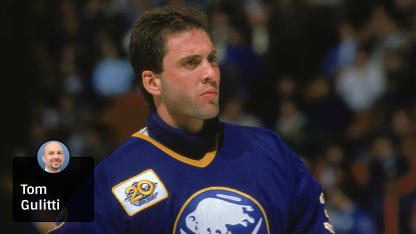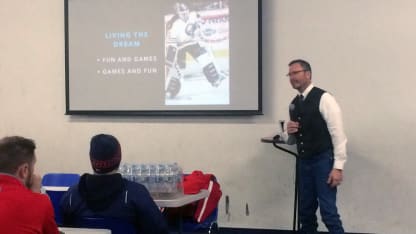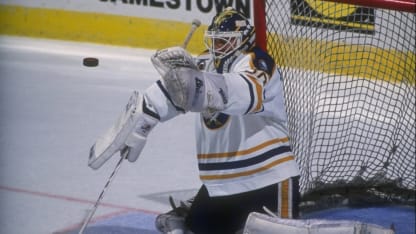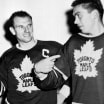ARLINGTON, Va. -- Clint Malarchuk is crying. And he's not the only one.
From Malarchuk's perspective, this is a good thing. It means his message about living with depression and post-traumatic stress disorder (PTSD) has hit home with his audience.
Clint Malarchuk has new lease on life
Former Sabres goalie grateful for chance to help others with depression after struggling himself

© Getty Images
"It means somebody out there is relating to what you're telling them," Malarchuk said.
On this day at the Washington Capitals' practice facility, Malarchuk, a former NHL goaltender and goalie coach, is addressing players from the USA Warriors Ice Hockey Program, which uses hockey as a recreational and therapeutic tool for those wounded while serving in defense of their country. For the past 2 ½ years, Malarchuk has traveled around the United States and Canada working as a mental health advocate and sharing the story of how he emerged from living almost 20 years in a personal hell that nearly cost him his life.
Also a certified horse dentist and horse chiropractor who operates a small ranch in Gardnerville, Nevada, Malarchuk estimates he does about 30 speaking engagements a year. He'll talk at corporations, high schools and colleges about his experiences with obsessive-compulsive disorder (OCD), depression, anxiety, alcoholism, attempted suicide and PTSD.
But he said his work with military veterans and first responders is the most gratifying. He called his afternoon with the USA Warriors, which included an on-ice scrimmage, "the best and the most fun that I've ever had and probably one of the most emotional I've ever had."
"There was so much relation with hockey and the love of hockey and healing through hockey and the PTSD that I have and probably quite a few in that room have," Malarchuk said. "So it was a pretty awesome experience for me."

How can a 55-year-old former goalie relate so well to those who have served and given so much to their country? Although Malarchuk has never been in the military, he has been where many of these veterans have been psychologically.
"I was looking forward to meeting him after I found out his situation because I wanted to know how he dealt with things from the civilian side," said retired U.S. Army Staff Sgt. Rafael Delgado, who was wounded while serving in Iraq. "But after [hearing him talk] I came to realize we have a lot of similarities.
"PTSD is PTSD. It doesn't matter where you got it."
\\*
Malarchuk, who played 10 NHL seasons for the Quebec Nordiques, Washington Capitals and Buffalo Sabres, begins his presentation with a warning. The story of how he was cut on the neck by a skate while playing for the Sabres on March 22, 1989, is well-known, but the ESPN "30 for 30 Short" documentary he's about to show the USA Warriors includes some graphic video.
"There's a little blood," Malarchuk tells them. "Would anybody be triggered by that? I hope not. If you are, close your eyes and just listen."
Malarchuk lost nearly one third of his blood that night, much of it onto the ice at Memorial Auditorium in Buffalo, after the skate blade of St. Louis Blues forward Steve Tuttle came up and struck him, slicing open his jugular vein and damaging the carotid artery. His life was saved by the actions of Sabres athletic trainer Jim Pizzutelli, a Vietnam veteran, and surgeons who used 300 stitches to close his wound.
A six-inch scar remains noticeable on the right side of Malarchuk's neck. The Grande Prairie, Alberta, native continues to live with psychological scars, too.
Although Malarchuk was playing against the Quebec Nordiques 11 days after being cut by Tuttle's skate, he was far from healed. For almost three years, he was plagued by panic attacks and recurring nightmares.
"I went 10 days without sleep," he said. "Every time I'd nod off, that skate would come up."
On Jan. 26. 1992, Malarchuk went to a Super Bowl party at the home of Sabres teammate Dale Hawerchuk and had a few drinks. Then he went home, drank a bottle of scotch and took his ulcer medicine and some painkillers he had been prescribed because of a broken vertebrae.

© Rick Stewart
"I couldn't sleep, so I come back from this [party] and I'm going to sleep because I've got the pill bottle and it said, 'Do not drink with alcohol, will make you drowsy,'" Malarchuk said. "I was like, 'Yes, I'm going to sleep tonight.'"
Malarchuk passed out on his bedroom floor and his heart stopped. He was rushed to the hospital and revived.
"No, it was not a suicide attempt. It was not. Not at that time," Malarchuk tells the audience. "I had PTSD. I had everything exploding."
\\\
According to the National Center for PTSD, about 7 percent to 8 percent of people in the United States will suffer from PTSD at some point in their lives. About 8 million adult Americans have PTSD each year.
The numbers are higher among veterans. An estimated 30 percent of Vietnam veterans have had PTSD. About 12 percent of Gulf War veterans and between 11 percent and 20 percent of veterans of Operations Iraqi Freedom and Enduring Freedom have PTSD each year.
"Our military, they survive the war, they come back and, even if their body is in one piece, a lot of them are sick mentally or injured mentally because of PTSD," Malarchuk said.
A study by the Department of Veteran Affairs released in 2016 estimated that an average of 20 veterans commit suicide each day. Malarchuk knows how many of them reached that point: He was not diagnosed with PTSD until after his suicide attempt on Oct. 7, 2008.
Following the Super Bowl party incident in 1992, Malarchuk was diagnosed with OCD. Dr. Stephen Stahl, a professor from the University of California, San Diego and a specialist in OCD, prescribed Zoloft and Malarchuk was OK for a while.
Then Florida Panthers forward Richard Zednik had his carotid artery sliced open by teammate Olli Jokinen's skate during a game in Buffalo on Feb. 10, 2008. Malarchuk, who was a goalie coach with the Columbus Blue Jackets at the time, was flooded with calls and interview requests.
Malarchuk had been taking his medication but hadn't spoken with a therapist in years. Zednik's accident sent him into a tailspin and he started drinking again.
"I wasn't seeing a psychiatrist and over 15 years I got immune to [the Zoloft] and then Richard Zednik happened and it was like a perfect storm, I guess," Malarchuk said.
Six months later, he got drunk at his ranch, held a rifle to his chin, and with his wife, Joanie, watching, pulled the trigger. The bullet shattered his chin, teeth, cheekbone and one of his eye sockets.
Somehow he survived. Again.
For this part of Malarchuk's story, an X-ray showing the bullet permanently lodged his skull is projected onto the video screen behind him.
"You wake up in the hospital with a bullet in your head, you dodge death three times, you start to think, 'What's the purpose?," Malarchuk tells the USA Warriors. "The two most important days of your life are the day you were born and the day you figure out why you were born. I thought I was born to be an NHL hockey player because I had the OCD and I did that and coached in the NHL. But even when I played in the NHL, I felt guilty. I felt guilty because I wasn't happy. I had anxiety. I had depression. I had all this stuff going on.
"Now I understand why I played in the NHL. I understand why I had demons, some I still fight today. But I found my purpose. My purpose is to be right here, to be of service to you men and women, and that's an awesome service."
\\\
After his failed suicide attempt, Malarchuk spent six months in a rehab facility in San Francisco. His initial reaction when told he had PTSD was denial; it didn't fit his tough guy image as the "Cowboy Goalie."
"I was so insulted, because I was a rock star in Buffalo," he said. "I came back so quickly [from being cut in the neck] that the town worshipped me because I epitomized everything that tough, blue-collar town like Buffalo was about. So when they said, 'You've got PTSD. That's why you've been struggling with all of this,' I was so insulted because of the stigma that it's a weakness, not a sickness. And it is [a sickness]. You're sick. You're injured."
That is the crux of Malarchuk's message. Being mentally ill doesn't mean you're not tough. Asking for help isn't a sign of weakness.
"When I was on active duty, I was diagnosed with depression and I was hospitalized," said Jane Polcen, a retired U.S. Army major. "I think it's just great that [Malarchuk] is putting this out there, especially with the military. I didn't know I had depression and when I found out you just don't want to tell anybody because you've got to stay strong, all the things [Malarchuk] talked about.
"Just like in the hockey world, in the military there's so many soldiers who will just not talk about it."
Malarchuk has learned that talking about it is therapeutic for him. He also wrote an autobiography with co-author Dan Robson titled, "A Matter of Inches - How I Survived in the Crease and Beyond." (In Canada, it was called "The Crazy Game.")
After the book was released in November 2014, Malarchuk began doing more public speaking engagements.
"I hated writing that," he said of the book. "People ask me the question, 'Was it therapeutic?' No, it was the hardest thing. I quit doing it over and over and I always went back to it. But since I did it, I've gotten so much feedback. And that's the other reason why I really like the military and first responders because the ones that have read my book have reached out to me and said, 'I thought I was the only one. I felt alone.'"
Malarchuk said after he realized he was not alone and accepted the PTSD diagnosis, he cried for three consecutive days. By now, several audience members are crying as well.
"It's pretty awesome when you know you helped them just by opening up," he said. "When I see other people out there with tears running down their cheeks, I usually end up doing the same."
Malarchuk has mixed in some humor to lighten the mood, but trauma and mental illness are heavy subjects. Delgado was one of those brought to tears by Malarchuk's story and needed some time to collect himself after hugging and thanking him afterward.
"His message is tough," Delgado said. "The fact that he's able to do this I hope teaches us not to try to keep being macho because I had to get to that point where I could say 'It's OK. It's OK.' I had to eliminate that myself."
Malarchuk said several of the USA Warriors who were there that day have reached out to him since. He's told them they have an open invitation to visit him at his ranch if they want to talk some more.
His dream is to incorporate his love of horses with equine therapy for first responders and military with PTSD.
"What I'd like to do is have a camp with cabins where you can have veterans come in and spend 10 days and work with the horses and equine therapists and have campfires and tell jokes and stories, where people can be around people they can relate to," Malarchuk said. "This is all in my head, but I'd like to have a psychologist for the 10 days there, too. So we can really have some fun and get people healing."

















